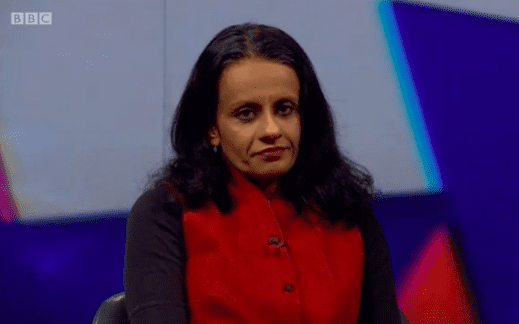Welsh National Opera’s new version of Puccini’s Madam Butterfly opens today. To help audiences understand the opera’s historical significance this week the producers staged an online discussion, ‘The Long Arm of Imperialism.’
It was chaired by professor Priyamvada Gopal who teaches postcolonial studies at Cambridge. She began by reminding us that many of the greatest operas in the canon were written in the 19th century, ‘when 85 per cent of the earth was, in some form or other, annexed to the cultural project…so there is no culture untouched by that project.’
In addition, she said, the concept of west-versus-east was a creation of colonialism:
‘The familiar categories of the west and the east…are categories that really only emerged in the 18th and 19th centuries as a consequence of the imperial project.’
What an odd theory. Most historians would point out that the gulf between the east and the west was active at least 2,500 years ago during the Persian wars of the 5th century BC. And it reaches back to the siege of Troy, which was an eastern city attacked by westerners from the Greek mainland and the Aegean islands. Perhaps Professor Gopal hasn’t heard of the ancient world.
She introduced Edson Burton, a historian, dramatist and ‘Afrofuturist’ who recently worked on the WNO’s forthcoming opera ‘Migrations’. The WNO website describes him as ‘a versatile poet performer whose work celebrates resilience.’
Each speaker seemed bewitched by the idea that history is a conspiracy against the future
Burton sees Madam Butterfly ‘in terms of the post-colonial moment…and I’m part of that.’ He explained, ‘this has very much come about, not just through the decline of empire, but as the metropolis has been transformed by people once seen as the silent subjects of empire’.
This appeared to refer to present-day migration to the UK. Like the other speakers, he appeared to describe the opera in terms of British colonialism, even though it’s an Italian work which examines America’s involvement in Japan.
The next speaker, Shreya Sen-Handley, also contributed to the libretto of ‘Migrations’. Her website reveals that she has worked as a playwright, poet, illustrator, travel writer, novelist, producer, music video director, cultural commentator, festival director, school governor and writing coach. She’s also an anthologised essayist.
Not surprisingly, she won the ‘Most Versatile Writer Award’ at the NWS writing awards in 2018. Her worry is that the ‘long arm of imperialism’ is still active today. She cited a recent spike in hate-crimes against ethnic minorities. And she argued that women are in a far worse position than their fellow citizens:
‘Gender is such a large part of what was wrong with empire…There is a racist hierarchy whereby the woman has the double-whammy of race and gender and gets exploited from all sides.’
She believes our school curriculum needs to be changed urgently:
‘As a parent, school governor and teacher, I see that the narrative hasn’t been rewritten. British schools are teaching the same deliberately deluded stories of grandeur and glory, and of empire being this force for good.’
She added that ‘the east’ is fetishised as something ‘romantic and mysterious that has to be civilised.’ There is a grave danger in this approach, she said. ‘If we continue to teach these delusions to our children we’ll continue to live in this deluded society.’
Next came Dr Robert Fokkens, a musician of South African heritage who teaches at Cardiff university. He’d just come from a rehearsal of Madam Butterfly whose ‘hard-hitting brutality’ had made him feel uncomfortable. ‘I found it quite distressing to be honest.’
He considers the story a ‘strong metaphor for the imperial project…Countries turned up and were free to act as they wished, whether they imposed themselves or were invited.’
He spoke about the American character, Pinkerton, who behaves with ‘sheer disinterested playful engagement’, but he hastily corrected this description. ‘I didn’t mean to imply there was anything ‘playful’ about imperialism.’ He was conspicuously deferential towards his fellow panellist, Edson Burton, and twice said that he was merely ‘rewording’ or ‘rephrasing’ what Burton had said.
Burton added some thoughts about Britain’s empire, and claimed that its true purpose had been suppressed at the highest level:
‘Successive British governments have been incredibly poor at informing us about what its job was round the world.’
He argued that falsehoods about the empire have deadly consequences even today:
‘Our media continues to export a colonial fantasy – a mythology – of the west that is seductive, and remains seductive, and for which people are dying because they are trying to reach this ideal, either physically or in the imagination.’
Is that why migrants risk their lives crossing the Channel? Because of a false vision of Britain engineered by the media? What a bizarre notion.
This was a very strange discussion all round. Each speaker seemed bewitched by the idea that history is a conspiracy against the future, and that everyone in ‘the post-colonial moment’ is destined to live in accordance with a set of power-structures that were dismantled decades ago.
These fretting academics should listen to Marcus Garvey, as quoted by Bob Marley in Redemption Song.
‘Emancipate ourselves from mental slavery, none but ourselves can free our minds’.






Comments